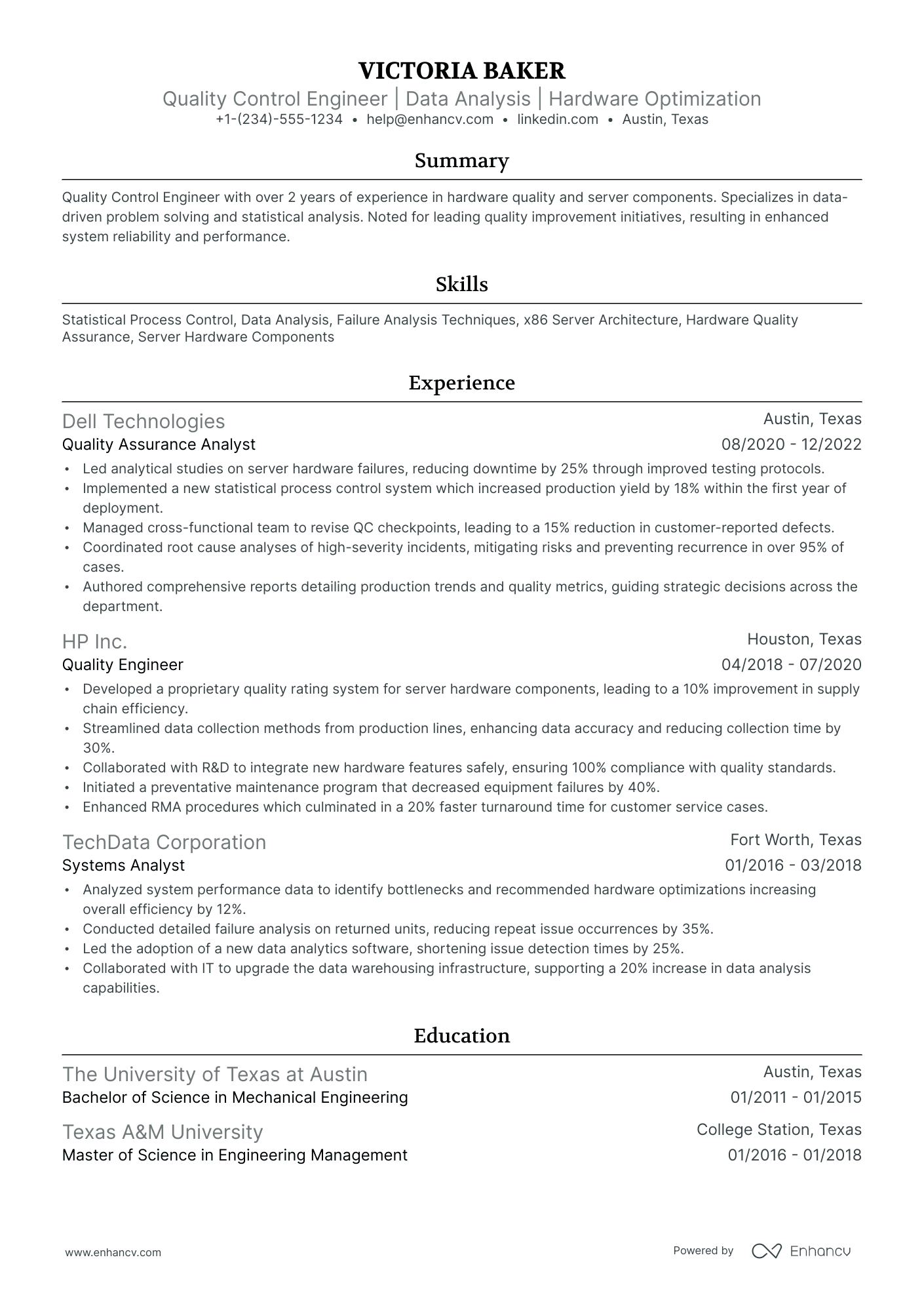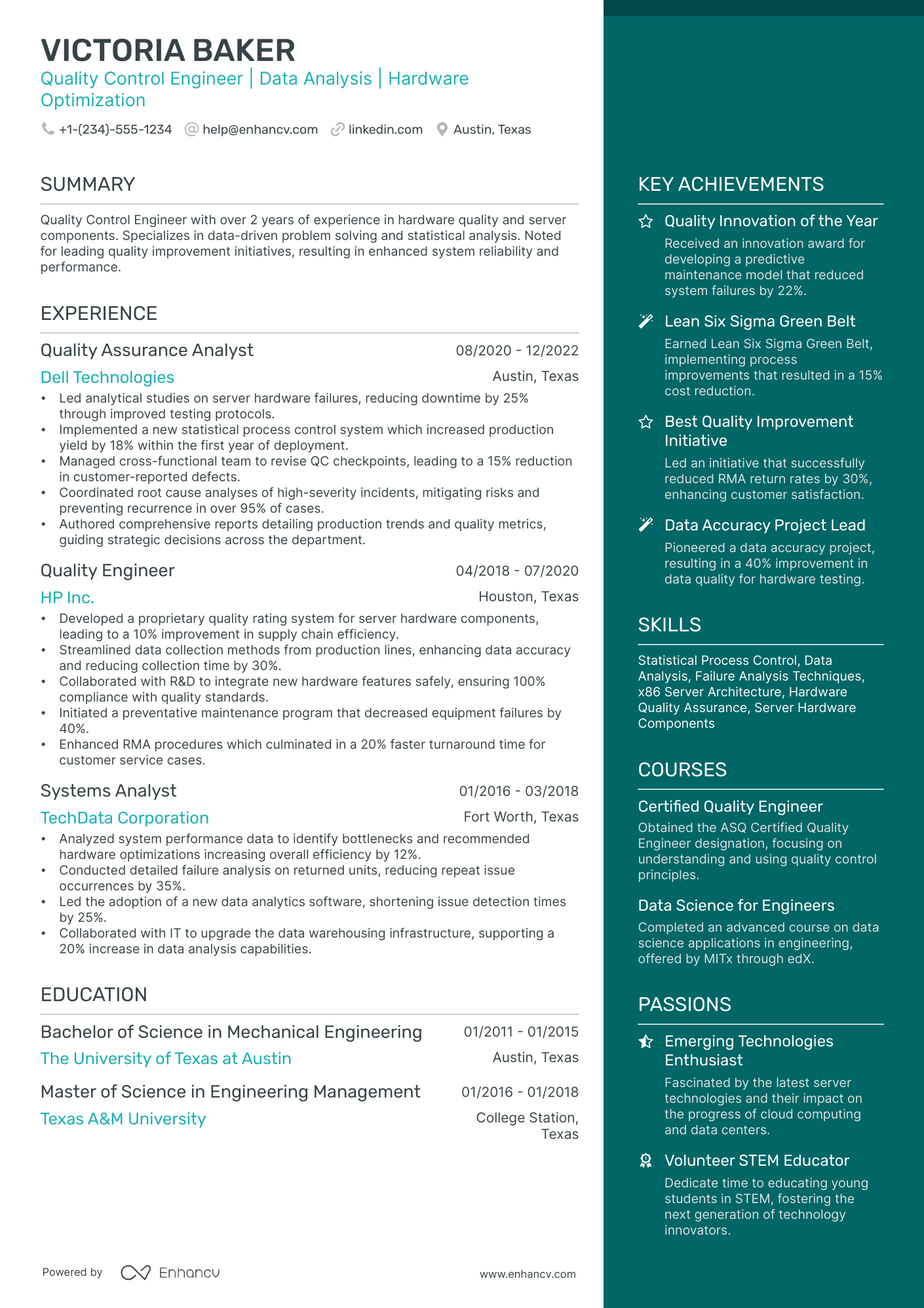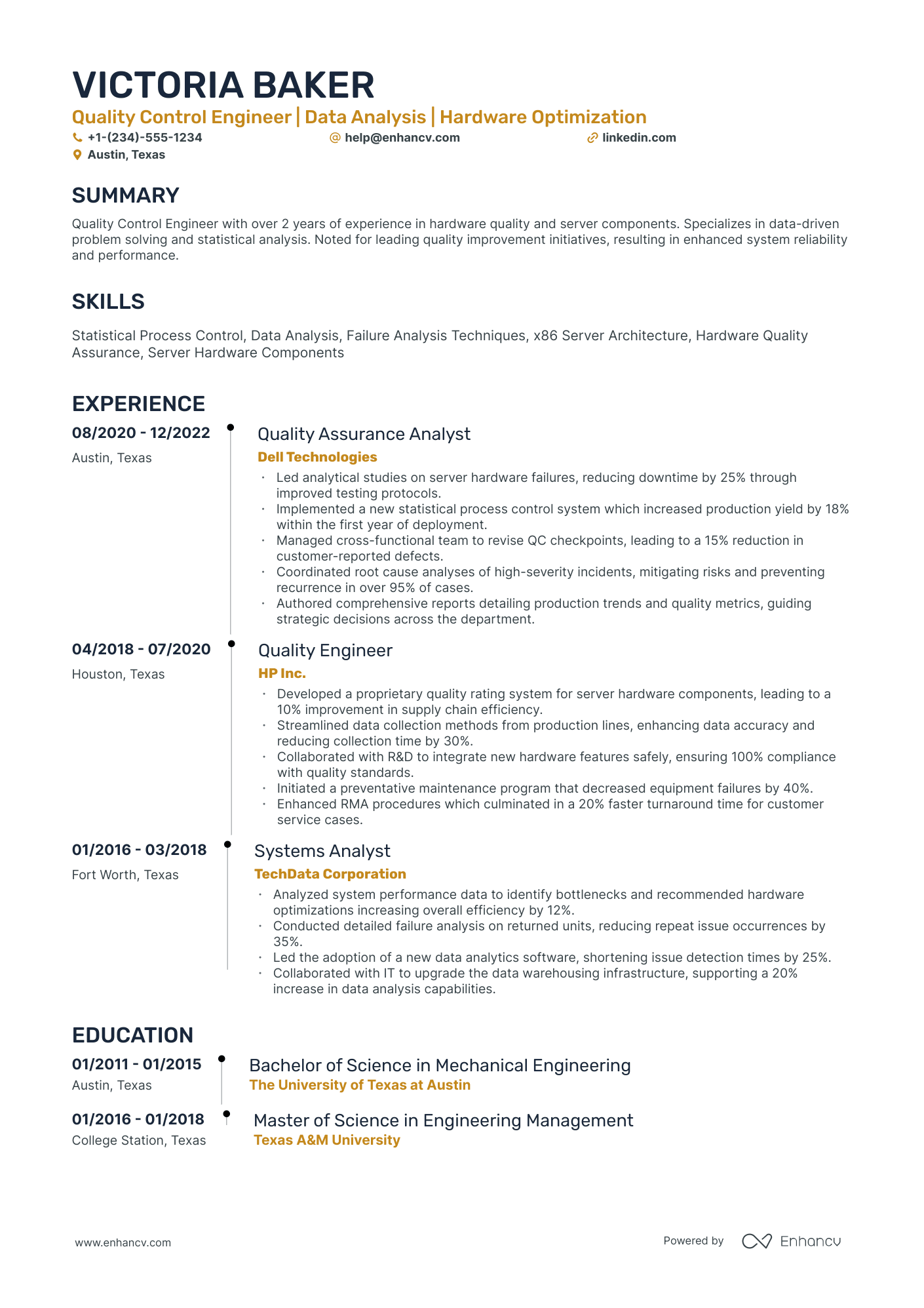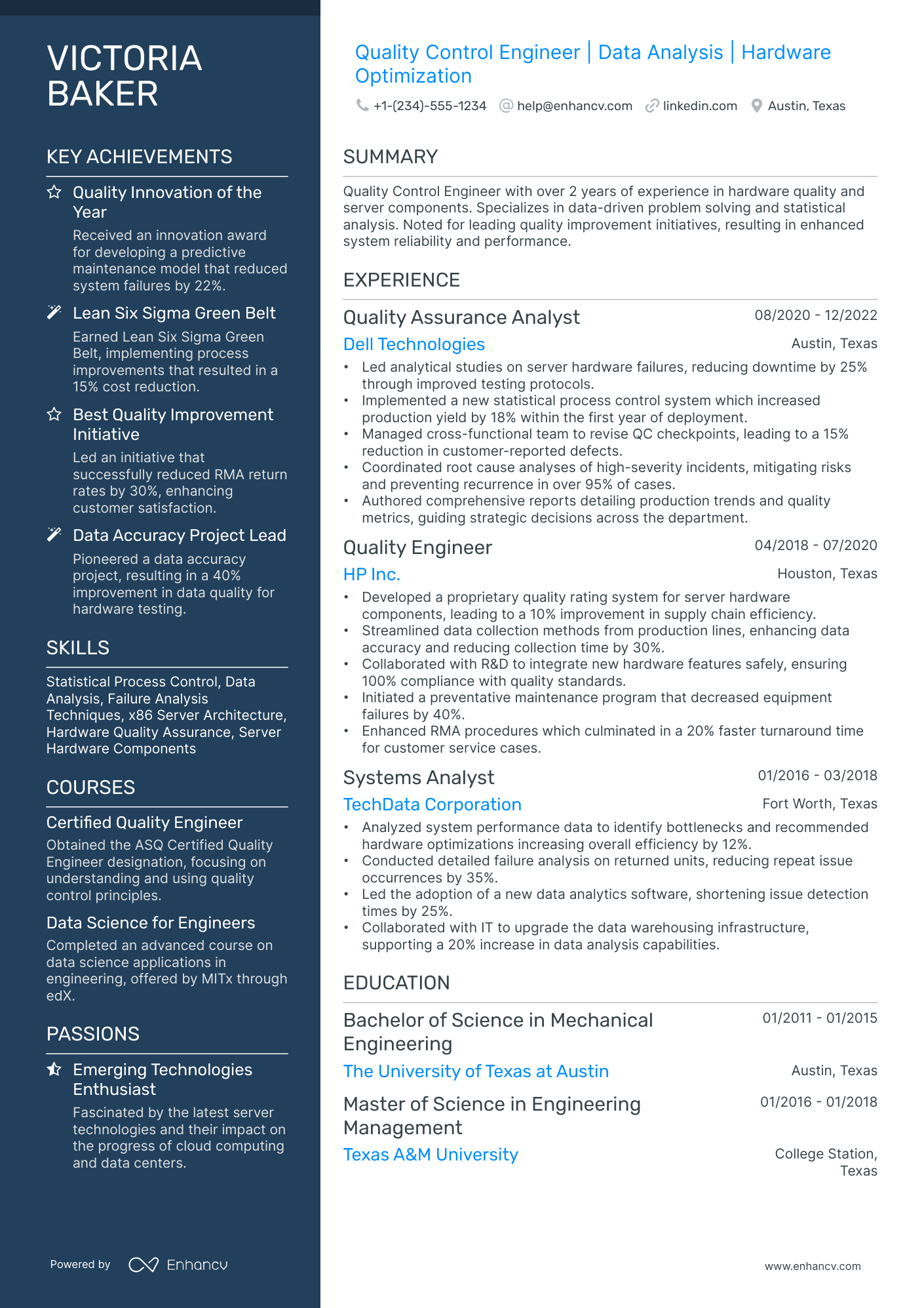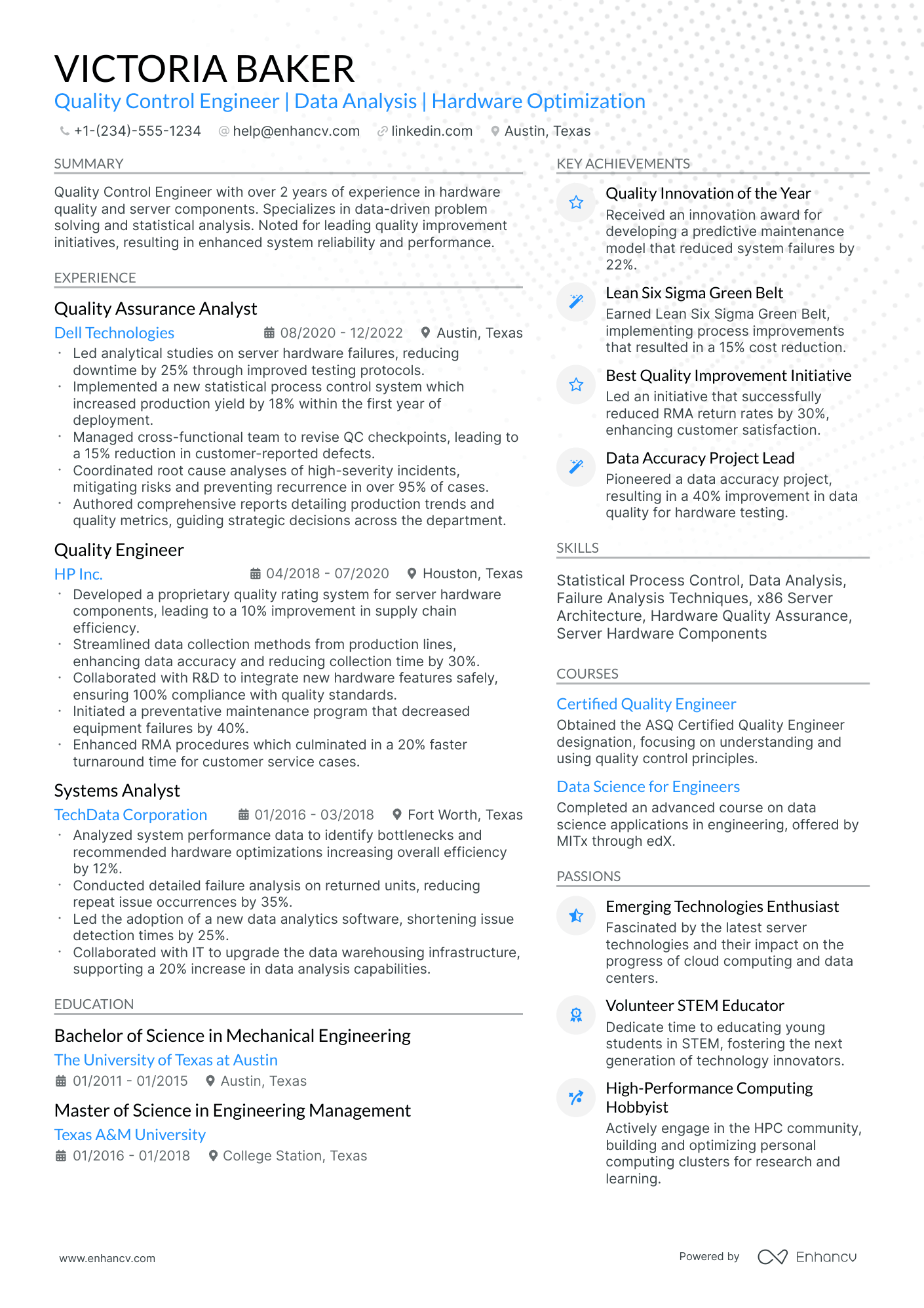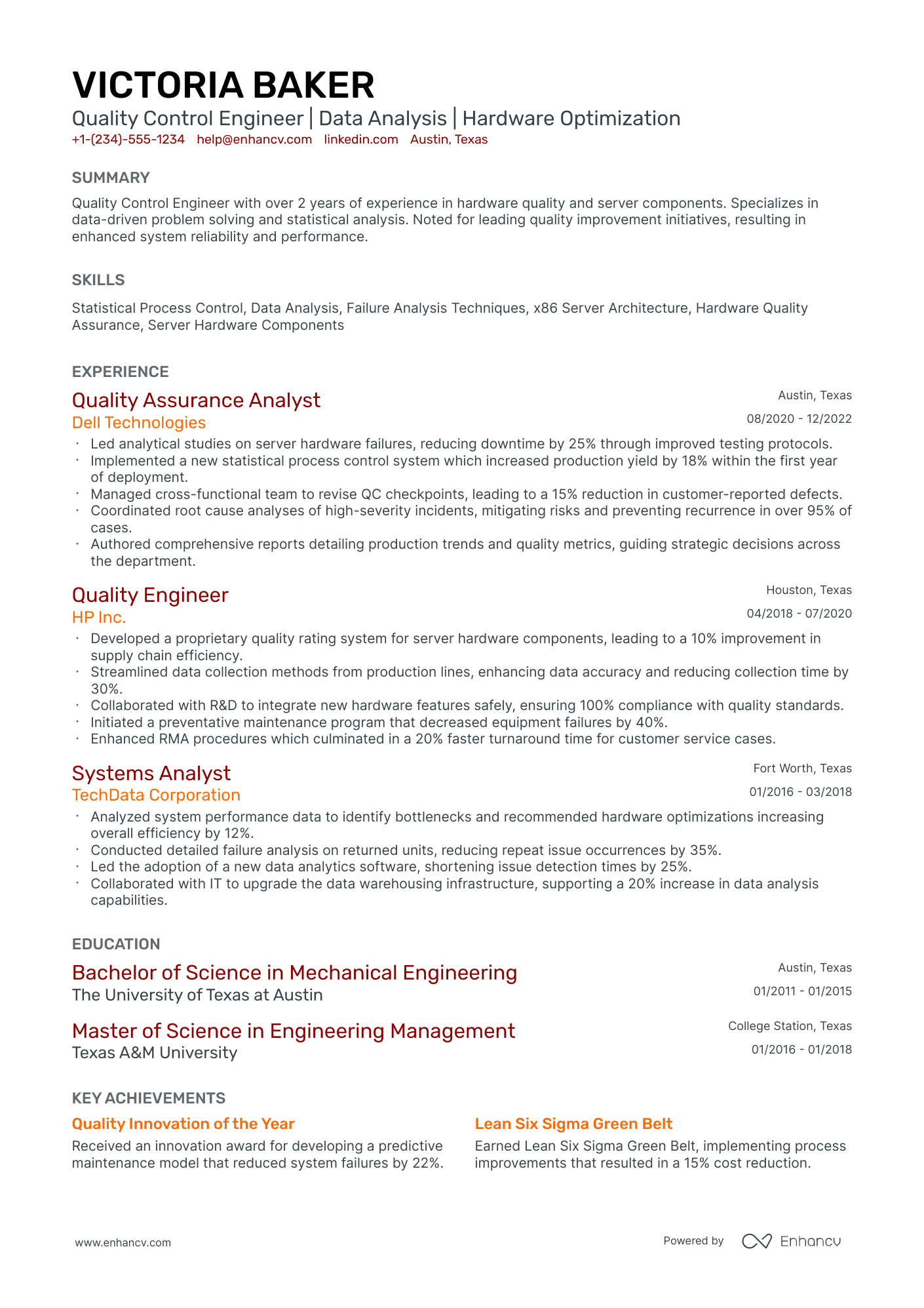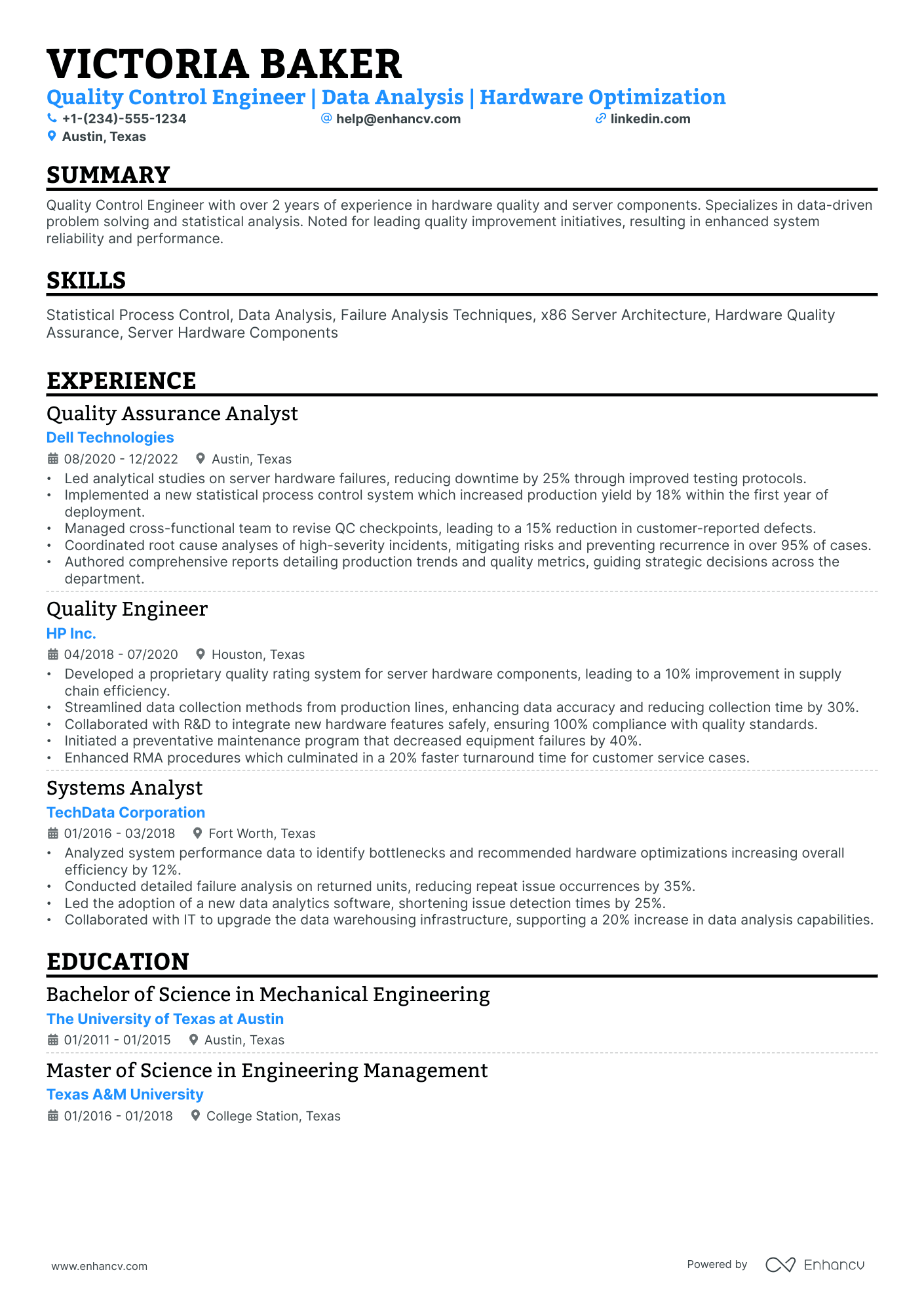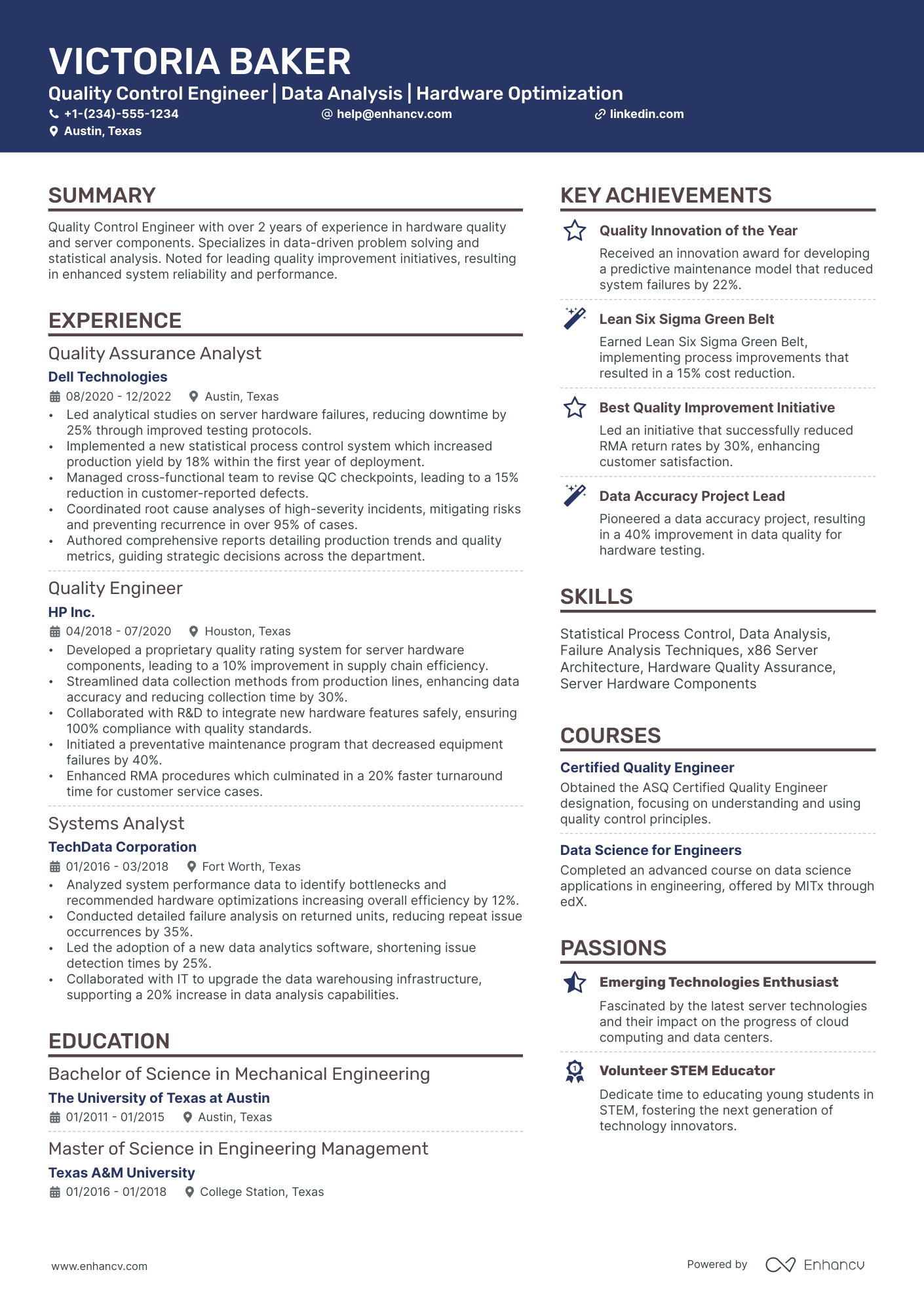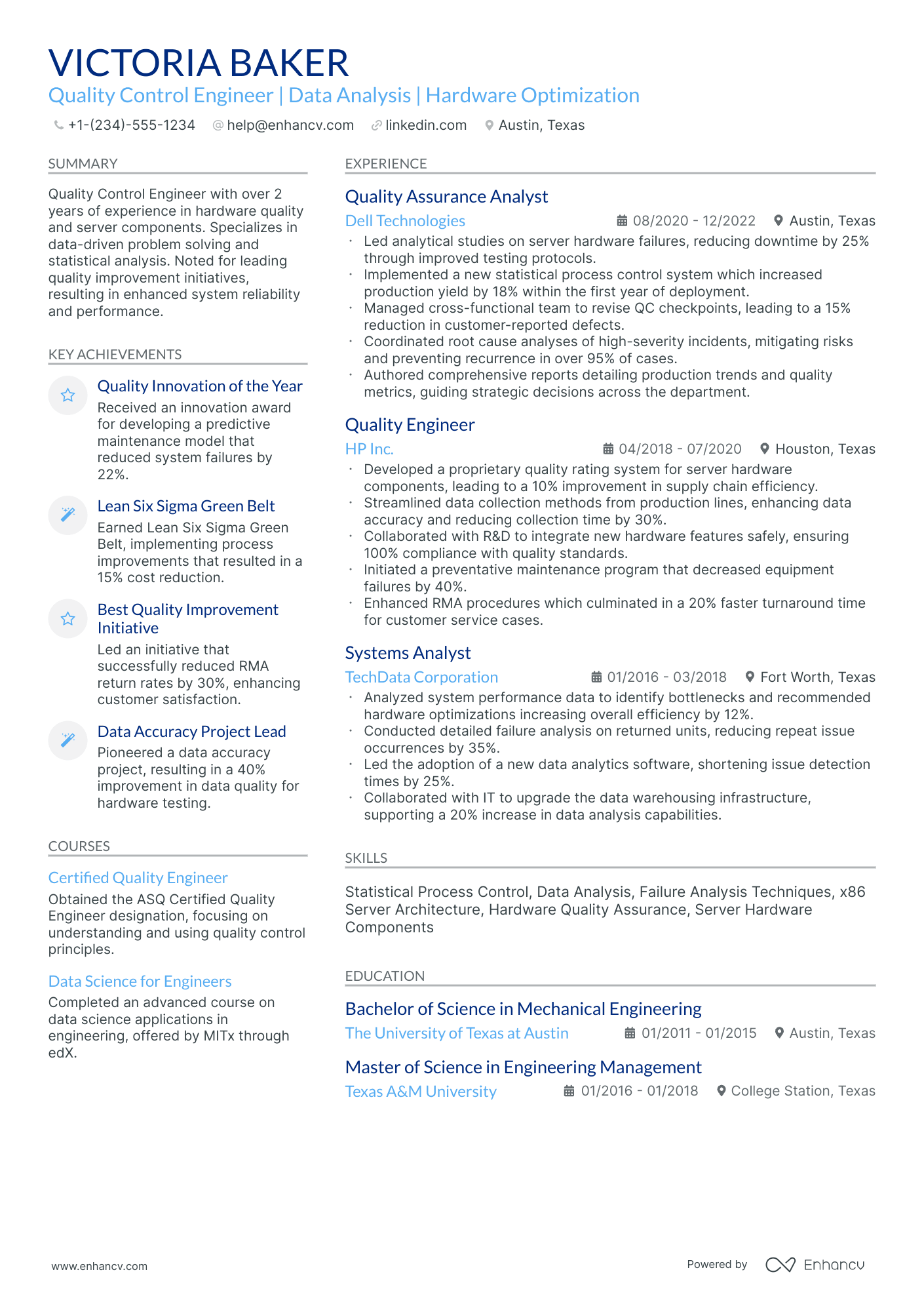Many quality control engineer resume submissions fail because they list inspections and tools but don't show quantified defect prevention, process control, and release impact. That gap gets filtered by applicant tracking systems and missed in fast recruiter scans.
A strong resume shows how you improved outcomes, not just what you did. Understanding how to make your resume stand out means highlighting yield gains, defect escape reduction, audit pass rates, cycle time cuts, cost-of-quality savings, and on-time release delivery across product lines.
Key takeaways
- Quantify defect reduction, yield gains, and audit results instead of listing inspection duties.
- Use reverse-chronological format for experienced engineers and hybrid format for career changers.
- Mirror the job posting's exact tools, standards, and KPIs in your experience bullets.
- Place skills above experience if you're junior; below experience if you're senior.
- Anchor every listed skill to a measurable outcome in your summary or experience section.
- Add certifications like CQE or Six Sigma directly after education to boost credibility.
- Use Enhancv to turn vague quality control duties into measurable, recruiter-ready bullet points.
How to format a quality control engineer resume
Recruiters evaluating quality control engineer resumes prioritize evidence of systematic defect reduction, regulatory compliance expertise, and measurable process improvements. A clear, well-organized resume format ensures these signals surface quickly during both automated screening and manual review.
I have significant experience in this role—which format should I use?
Use a reverse-chronological format to present your quality control engineering career in a clear, progression-driven timeline. Do:
- Lead with your most recent role and emphasize scope of ownership—team size, number of product lines overseen, and cross-functional accountability.
- Highlight domain-specific expertise such as ISO 9001, Six Sigma, SPC tools, CAPA management, root cause analysis, and inspection methodology.
- Quantify outcomes tied to defect reduction, cost savings, audit results, and compliance milestones.
- "Reduced product defect rate by 34% across three manufacturing lines by redesigning incoming material inspection protocols and implementing real-time SPC monitoring, saving $1.2M annually in rework and scrap costs."
I'm junior or switching into this role—what format works best?
A hybrid format works best, letting you lead with relevant QC skills and certifications while still showing your work history in chronological order. Do:
- Place a skills section near the top featuring quality control tools, standards, and methodologies—such as GD&T, FMEA, CMM operation, or ISO auditing—so recruiters and applicant tracking systems register your qualifications immediately.
- Include academic projects, internships, or transitional experience where you performed inspections, developed test plans, or contributed to quality documentation.
- Connect each action to a clear result, even at a small scale, to demonstrate analytical thinking and process orientation.
- Statistical process control (skill) → analyzed dimensional data from 500+ parts per week to flag out-of-spec trends (action) → reduced line stoppage incidents by 18% during a six-month co-op rotation (result).
Why not use a functional resume?
A functional format strips away the timeline context that hiring managers rely on to verify where, when, and how you applied your quality control skills, making it harder to assess your readiness for the role.
- A functional format may be acceptable if you're transitioning from a related field (such as manufacturing or lab science), have a gap in employment, or have limited formal QC work history—but only if every listed skill is anchored to a specific project, coursework, or outcome rather than presented as a standalone claim.
Once your layout and formatting choices are in place, the next step is deciding which sections to include so each one reinforces your qualifications.
What sections should go on a quality control engineer resume
Recruiters expect a quality control engineer resume to show measurable quality improvements, strong process control, and clear ownership of testing and compliance outcomes. Knowing what to put on a resume helps you prioritize the right content. Use this structure for maximum clarity:
- Header
- Summary
- Experience
- Skills
- Projects
- Education
- Certifications
- Optional sections: Awards, Publications, Languages
Your experience bullets should emphasize defect reduction, yield and reliability gains, audit and compliance results, and the scope of processes, products, and cross-functional impact you owned.
Is your resume good enough?
Drop your resume here or choose a file. PDF & DOCX only. Max 2MB file size.
Once you’ve organized your resume with the right core sections, the next step is to write your quality control engineer resume experience so it fits that structure and shows your impact.
How to write your quality control engineer resume experience
The work experience section is where you prove you've shipped reliable results—not just performed inspections. Hiring managers prioritize demonstrated impact through role-relevant tools, testing methods, and measurable quality outcomes over descriptive task lists.
Each entry should include:
- Job title
- Company and location (or remote)
- Dates of employment (month and year)
Three to five concise bullet points showing what you owned, how you executed, and what outcomes you delivered:
- Ownership scope: the product lines, manufacturing processes, inspection programs, or compliance systems you were directly accountable for as a quality control engineer.
- Execution approach: the testing equipment, statistical methods, quality management frameworks, or inspection technologies you applied to identify defects, validate specifications, and drive corrective actions.
- Value improved: the changes you made to defect rates, process reliability, regulatory compliance, product consistency, or risk exposure through your quality control work.
- Collaboration context: how you partnered with production teams, suppliers, design engineers, or regulatory bodies to align quality standards and resolve nonconformances.
- Impact delivered: the outcomes your quality control efforts produced—expressed through reductions in waste, improvements in yield, faster resolution cycles, or strengthened compliance posture rather than a list of tasks performed.
Experience bullet formula
A quality control engineer experience example
✅ Right example - modern, quantified, specific.
Quality Control Engineer
Apex Medical Devices | Irvine, CA
2021–Present
FDA-regulated manufacturer of Class II infusion systems producing 250K+ units annually.
- Implemented risk-based inspection plans using ANSI/ASQ Z1.4 sampling and Minitab control charts, cutting incoming defects by 32% and reducing inspection time by 18%.
- Led root cause analysis (8D, 5 Whys, and fishbone) with manufacturing and supplier quality teams, closing forty-seven corrective and preventive actions (CAPAs) with a 96% on-time rate and lowering repeat nonconformances by 41%.
- Validated critical processes (IQ/OQ/PQ) for ultrasonic welding and automated leak testing, improving first-pass yield from 93.8% to 97.1% and preventing an estimated $420K in annual scrap.
- Built a Power BI dashboard fed by SAP quality notifications and electronic device history records, improving lot disposition cycle time by 22% and giving operations real-time visibility into top defect drivers.
- Partnered with design and reliability engineers on DFMEA and verification testing (GR&R, gauge calibration, and accelerated life testing), reducing field complaint rate from 0.62% to 0.38% within twelve months.
Now that you've seen how a strong experience section comes together, let's look at how to adjust yours to match the specific job you're targeting.
How to tailor your quality control engineer resume experience
Recruiters evaluate your quality control engineer resume through applicant tracking systems and manual review, filtering for specific skills and qualifications. Tailoring your resume to the job description ensures your relevant expertise surfaces during both stages.
Ways to tailor your quality control engineer experience:
- Match inspection tools and testing equipment listed in the job description.
- Mirror the exact quality standards referenced like ISO or Six Sigma.
- Use the same terminology for defect tracking systems the employer names.
- Highlight SPC or root cause analysis methods when the posting specifies them.
- Include industry-specific experience such as automotive or pharmaceutical manufacturing.
- Quantify results using the same KPIs or metrics the job listing prioritizes.
- Emphasize regulatory compliance expertise when the role requires audit readiness.
- Reference cross-functional collaboration with production or engineering teams if mentioned.
Tailoring means aligning your real accomplishments with what the employer asks for, not forcing disconnected keywords into your experience bullets.
Resume tailoring examples for quality control engineer
| Job description excerpt | Untailored | Tailored |
|---|---|---|
| Perform root cause analysis using 8D methodology to resolve nonconformances in automotive parts manufacturing. | Helped identify and fix quality issues in production. | Led root cause analysis investigations using 8D methodology, resolving 34 nonconformances in automotive parts manufacturing over 12 months and reducing repeat defects by 22%. |
| Conduct incoming, in-process, and final inspections using CMM, calipers, and micrometers per AS9100 standards. | Inspected products to make sure they met quality standards. | Executed incoming, in-process, and final inspections using CMM, calipers, and micrometers, maintaining 99.6% compliance with AS9100 standards across 3 production lines. |
| Develop and maintain inspection plans and control charts using Minitab to support SPC initiatives in a medical device environment. | Created reports and tracked data related to quality processes. | Developed inspection plans and maintained control charts in Minitab to support SPC initiatives, reducing process variation by 18% across 5 medical device product families. |
Once you’ve aligned your experience with the role’s requirements, quantify your achievements to show the measurable impact of that work.
How to quantify your quality control engineer achievements
Quantifying your achievements shows how you improved product quality, reduced risk, and sped up releases. Focus on defect rates, test coverage, inspection throughput, escape rates, audit results, rework cost, and cycle time.
Quantifying examples for quality control engineer
| Metric | Example |
|---|---|
| Defect reduction | "Cut production defects from 2.8% to 1.6% in three months by tightening incoming inspection and adding AQL sampling plans in Minitab." |
| Escape rate | "Reduced customer-reported defects by 38% by adding a pre-ship functional test checklist and updating control plans for five high-risk assemblies." |
| Inspection throughput | "Increased inspection throughput from 120 to 175 units per shift by redesigning the gauge layout and standardizing work instructions in a digital checklist." |
| Audit compliance | "Passed two ISO 9001 surveillance audits with zero major nonconformities by closing 27 corrective actions and improving document control turnaround time by 45%." |
| Rework cost | "Lowered rework and scrap costs by $95,000 annually by running eight root cause analyses and implementing corrective actions tracked in a CAPA log." |
Turn vague job duties into measurable, recruiter-ready resume bullets in seconds with Enhancv's Bullet Point Generator.
Once you've crafted strong bullet points for your experience section, you'll want to apply that same precision to presenting your hard and soft skills effectively.
How to list your hard and soft skills on a quality control engineer resume
Your skills section shows you can prevent defects and control risk, and recruiters and ATS scan it to match you to the job requirements fast, so aim for a balanced mix of hard skills and role-specific soft skills.
quality control engineer roles require a blend of:
- Product strategy and discovery skills.
- Data, analytics, and experimentation skills.
- Delivery, execution, and go-to-market discipline.
- Soft skills.
Your skills section should be:
- Scannable (bullet-style grouping).
- Relevant to the job post.
- Backed by proof in experience bullets.
- Updated with current tools.
Place your skills section:
- Above experience if you're junior or switching careers.
- Below experience if you're mid/senior with strong achievements.
Hard skills
- Statistical process control
- Control plans, PPAP, APQP
- FMEA, 8D, CAPA
- Root cause analysis, 5 Whys
- Gage R&R, MSA
- ISO 9001, IATF 16949
- Inspection plans, sampling plans
- GD&T, blueprint reading
- CMM, optical comparator
- Minitab, Excel, SQL
- Supplier quality audits
- Nonconformance, MRB workflows
Soft skills
- Translate specs into checks
- Challenge requirements with data
- Run cross-functional RCAs
- Write clear NCRs and 8Ds
- Escalate risk with urgency
- Align stakeholders on containment
- Negotiate corrective actions
- Coach operators on standards
- Prioritize by defect severity
- Hold vendors accountable
- Document decisions for traceability
- Follow up until closure
How to show your quality control engineer skills in context
Skills shouldn't live only in a bulleted list on your resume. Explore resume skills examples to see how top candidates weave competencies throughout their documents.
They should be demonstrated in:
- Your summary (high-level professional identity)
- Your experience (proof through outcomes)
Here's how that looks in practice.
Summary example
Senior quality control engineer with 10+ years in automotive manufacturing. Skilled in SPC, FMEA, and root cause analysis using Minitab. Led cross-functional teams to reduce defect rates by 34% while maintaining ISO 9001 compliance.
- Reflects senior-level experience clearly
- Names industry-specific tools and methods
- Quantifies impact with a strong metric
- Highlights leadership as a soft skill
Experience example
Senior Quality Control Engineer
Bridgewell Automotive Components | Detroit, MI
March 2018–January 2024
- Implemented SPC protocols across three production lines, reducing defect rates by 27% within 18 months.
- Partnered with design and manufacturing engineers to revise FMEA documentation, cutting corrective action cycle time by 40%.
- Led ISO 9001 internal audits and coached 15 technicians on updated inspection procedures, achieving zero nonconformances in two consecutive reviews.
- Every bullet includes measurable proof
- Skills appear naturally through real outcomes
Once you’ve demonstrated your quality control engineer skills through specific results and examples, the next step is to apply that same approach to building a quality control engineer resume when you have no experience.
How do I write a quality control engineer resume with no experience
Even without full-time experience, you can demonstrate readiness through projects and coursework. If you're building a resume without work experience, focus on these types of entries:
- Quality inspection course capstone project
- ISO 9001 internal audit simulation
- Six Sigma Yellow Belt project
- Gauge repeatability and reproducibility study
- Statistical process control lab reports
- Root cause analysis case study
- Internship in manufacturing quality lab
- Supplier quality evaluation assignment
Focus on:
- Inspection methods and measurement tools
- Statistical process control with evidence
- Corrective and preventive action examples
- ISO 9001 documentation familiarity
Resume format tip for entry-level quality control engineer
Use a hybrid resume format because it highlights projects and skills first while still showing education and any relevant work history. Do:
- Put projects above work history.
- Quantify results with defect rates.
- List tools: calipers, micrometers, CMM.
- Add methods: gauge repeatability and reproducibility, statistical process control, corrective and preventive action.
- Include standards: ISO 9001 terminology.
- Completed a gauge repeatability and reproducibility study on three operators using calipers and Minitab, reducing measurement variation by 18% through updated work instructions.
Once you've positioned your limited experience in the best possible light, the next step is ensuring your education section reinforces your qualifications for the role.
How to list your education on a quality control engineer resume
Your education section helps hiring teams confirm you have the foundational technical knowledge a quality control engineer needs. It validates your training in engineering principles, statistics, and process control.
Include:
- Degree name
- Institution
- Location
- Graduation year
- Relevant coursework (for juniors or entry-level candidates)
- Honors & GPA (if 3.5 or higher)
Skip month and day details—list the graduation year only.
Here's a strong education entry tailored for a quality control engineer resume.
Example education entry
Bachelor of Science in Industrial Engineering
Ohio State University, Columbus, OH
Graduated 2021
GPA: 3.7/4.0
- Relevant Coursework: Statistical Process Control, Six Sigma Methods, Manufacturing Systems, Quality Assurance & Reliability Engineering
- Honors: Magna Cum Laude, Dean's List (six semesters)
How to list your certifications on a quality control engineer resume
Certifications on your resume show your commitment to learning, prove tool proficiency, and confirm industry relevance as a quality control engineer, especially when standards and methods change quickly.
Include:
- Certificate name
- Issuing organization
- Year
- Optional: credential ID or URL
- Put certifications below education when they are older, less relevant, or you want your degree to lead your quality control engineer story.
- Put certifications above education when they are recent, highly relevant, or required for the quality control engineer roles you target.
Best certifications for your quality control engineer resume
- ASQ Certified Quality Engineer (CQE)
- ASQ Certified Quality Auditor (CQA)
- ASQ Certified Six Sigma Green Belt (CSSGB)
- ASQ Certified Six Sigma Black Belt (CSSBB)
- ISO 9001:2015 Lead Auditor
- ISO 13485:2016 Lead Auditor
- IPC-A-610 Certified IPC Specialist (CIS)
Once you’ve placed your certifications where recruiters can scan them quickly, focus on writing your quality control engineer resume summary so it reinforces those qualifications upfront.
How to write your quality control engineer resume summary
Your resume summary is the first thing a recruiter reads. A strong one immediately signals you're qualified for the quality control engineer role.
Keep it to three to four lines, with:
- Your title and total years of quality control or QA experience.
- The industry or product type you've worked in, such as manufacturing, pharmaceuticals, or electronics.
- Core tools and skills like SPC, root cause analysis, FMEA, or ISO 9001 auditing.
- One or two measurable achievements, such as defect reductions or audit pass rates.
- Soft skills tied to real outcomes, like cross-functional collaboration that improved first-pass yield.
PRO TIP
At this level, emphasize technical competence, relevant certifications, and early measurable contributions. Highlight specific tools and inspection methods you've used in real projects. Avoid vague descriptors like "detail-oriented" or "passionate about quality." Replace them with concrete skills and results that prove your capability.
Example summary for a quality control engineer
Quality control engineer with three years of experience in automotive manufacturing. Skilled in SPC, FMEA, and ISO 9001 compliance. Reduced product defect rates by 18% through improved inspection protocols.
Optimize your resume summary and objective for ATS
Drop your resume here or choose a file.
PDF & DOCX only. Max 2MB file size.
Now that you've crafted a summary that highlights your expertise, make sure the header above it presents your contact details correctly so recruiters can actually reach you.
What to include in a quality control engineer resume header
A resume header is the top section with your key identifiers, and it boosts visibility, credibility, and recruiter screening for a quality control engineer.
Essential resume header elements
- Full name
- Tailored job title and headline
- Location
- Phone number
- Professional email
- GitHub link
- Portfolio link
A LinkedIn link helps recruiters verify experience quickly and supports screening.
Don't include a photo on a quality control engineer resume unless the role is explicitly front-facing or appearance-dependent.
Use a clear job title, keep links short, and match your header details to your application and LinkedIn for consistent screening.
Example
Quality control engineer resume header
Jordan Lee
Quality control engineer | ISO 9001 audits, CAPA, and root cause analysis
Austin, TX
(512) 555-13XX
your.name@enhancv.com
github.com/yourname
yourwebsite.com
linkedin.com/in/yourname
Once your contact details and role identifiers are clear and easy to verify at a glance, add the following optional sections to provide supporting context and strengthen the rest of your resume.
Additional sections for quality control engineer resumes
Adding extra sections strengthens your resume when they highlight specialized expertise or credentials that set you apart from other candidates.
Choose sections that directly reinforce your quality control engineer qualifications:
- Languages
- Certifications and licenses
- Professional affiliations
- Publications
- Continuing education and training
- Volunteer experience
- Awards and recognitions
Once you've strengthened your resume with relevant additional sections, the next step is pairing it with a well-crafted cover letter to make an even stronger impression.
Do quality control engineer resumes need a cover letter
A cover letter isn't required for a quality control engineer, but it helps in competitive searches or when hiring managers expect one. It can make a difference when your resume needs context, or when you want to show clear fit.
Use a cover letter to add details your resume can't:
- Explain role or team fit by matching your testing approach to the team's process, tools, and release cadence.
- Highlight one or two relevant projects or outcomes, including defect reduction, audit readiness, or faster root cause analysis.
- Show understanding of the product, users, or business context by naming key risks, regulations, or quality metrics that matter.
- Address career transitions or non-obvious experience by connecting past work to quality control engineer responsibilities and results.
Drop your resume here or choose a file.
PDF & DOCX only. Max 2MB file size.
Once you’ve decided whether to include a cover letter to support your application, the next step is using AI to improve your quality control engineer resume so it aligns with the role and highlights your qualifications.
Using AI to improve your quality control engineer resume
AI can sharpen your resume's clarity, structure, and impact. It helps you refine bullet points and align content with real job demands. But overuse strips authenticity. Once your resume is clear and role-aligned, step away from AI. For specific guidance, explore ChatGPT resume writing prompts tailored to different resume sections.
Here are 10 practical prompts you can copy, paste, and customize right away:
Strengthen your summary
Quantify experience bullets
Align skills with job posts
Tighten action verbs
Improve project descriptions
Clarify certification relevance
Refine education details
Remove redundant content
Tailor for specific industries
Enhance readability
Conclusion
A strong quality control engineer resume proves impact with measurable outcomes, like fewer defects, faster inspections, or higher yield. It highlights role-specific skills, including root cause analysis, statistical process control, audits, and corrective and preventive actions.
Keep the structure clear and scannable, with focused sections and consistent formatting. Show you’re ready for today’s and near-future hiring market by aligning results and skills to the role.
